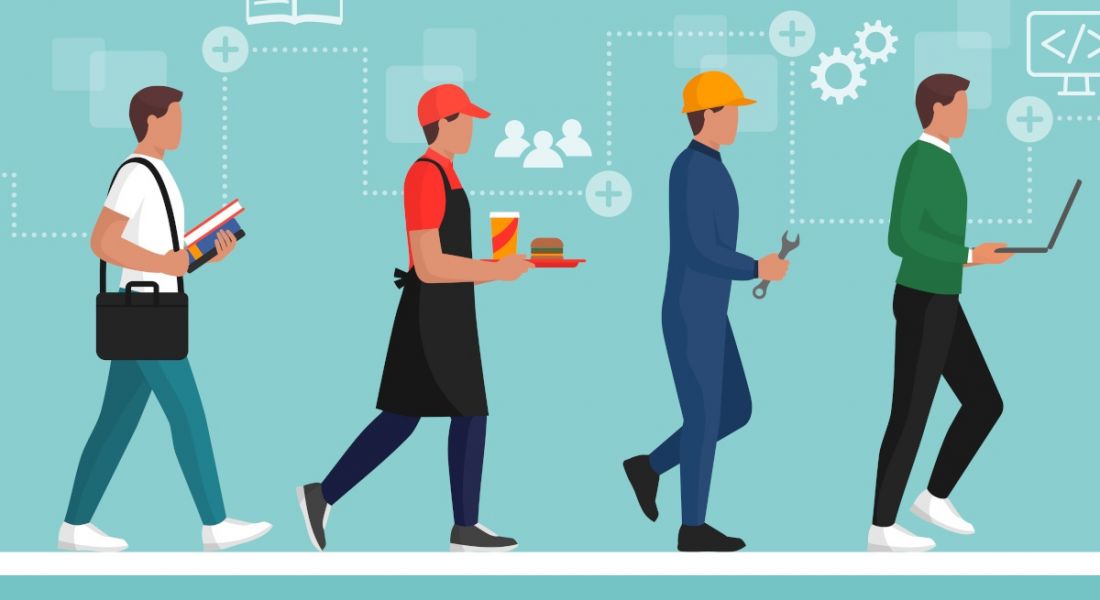Common sense dictates that white-collar workers will be more impacted by generative AI, but higher-skilled STEM jobs will be less affected.
Research carried out by digital learning company Pearson has found that while both white-collar and blue-collar workers will be impacted by generative AI, the former will feel the effect of the tech far more.
Of course, Pearson is not the first organisation to posit that generative AI will have a bearing on the way admin and office workers do their jobs. For good, bad or indifferent, generative AI is already being used in Irish workplaces, according to a recent Deloitte survey. It makes sense that generative AI will not have as much impact on blue-collar workers, such as trades people and labourers, because they rely on tech less than office workers.
What Pearson’s data reveals is a breakdown of jobs that will be impacted by generative AI over the next 10 years. Pearson relied on census and other workforce datasets to create a view of the current workforce in the US, UK, Australia, India and Brazil.
It used machine learning algorithms to calculate future technology impact on each job based on individual tasks associated with the jobs. According to the US results, CEOs, civil engineers, electrical engineers, sales managers and architectural and engineering managers will be the white-collar careers least affected by generative AI.
The white-collar roles most impacted by generative AI will be medical secretaries, clerks and bookkeepers. As Pearson’s report pointed out, these jobs contain repetitive tasks such as scheduling appointments and directing calls that can be done by generative AI tech.
The white-collar jobs that are least impacted by generative AI are highly-skilled STEM jobs in the maths and engineering sectors. When the research looked specifically at the time spent on individual tasks in a working week, it found that 30pc of some white-collar roles could be done by generative AI.
The findings also showed that less than 1pc of time spent on tasks involved in many blue-collar jobs could be done by generative AI. Blue-collar workers such as hospitality hosts, food service managers and machine operators are more likely to be affected by tech than workers such as mechanics, dishwashers and maintenance workers.
How to ride the wave
“As employees look to the future, understanding which jobs are at risk from AI allows them to prepare,” said Mike Howells, president of Pearson’s workforce skills division.
“They should also consider where new roles might be created by generative AI. Workers and employers should look at how they can ride this wave of change by using the best of AI and the best of human skills together – whether that is using the technology to take over repetitive tasks, so people can focus on high-value activities or enhancing those uniquely human skills like creativity, communication and leadership.“
There is also the fact that generative AI is creating new jobs, particularly in the tech industry. Job search site Adzuna pointed out that the sector is hiring prompt engineers, AI ethics officers, chief AI officers, AI auditors, AI trainers and more.
Adzuna co-founder Andrew Hunter offered his thoughts on how the jobs landscape will be affected by AI. “Skilled, white-collar workers whose jobs rely on their wealth of knowledge may be particularly at risk, with AI increasingly able to emulate responses and outputs.”
“Job vacancies have fallen across the board year-on-year, but some jobs have seen larger declines that may in part be due to the increasing adoption of AI,” he said, mentioning creative roles and admin and even data analyst roles. Others argue that AI can augment creative workers, particularly start-up workers.
“But despite the falling outlook in these areas, AI will also create new job opportunities for roles like prompt engineer as companies clamour to make the most of advancements,” Hunter concluded. “There are also other roles where we believe society would not currently accept AI in place of humans, for example, CEOs and politicians.”
10 things you need to know direct to your inbox every weekday. Sign up for the Daily Brief, Silicon Republic’s digest of essential sci-tech news.




